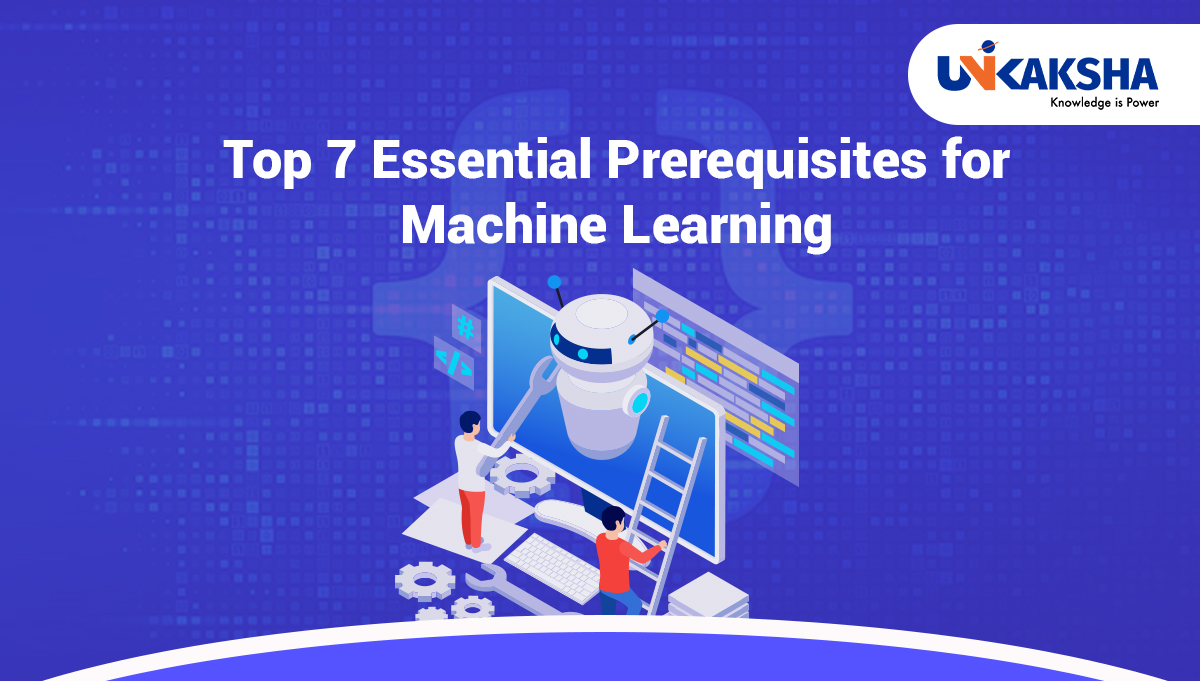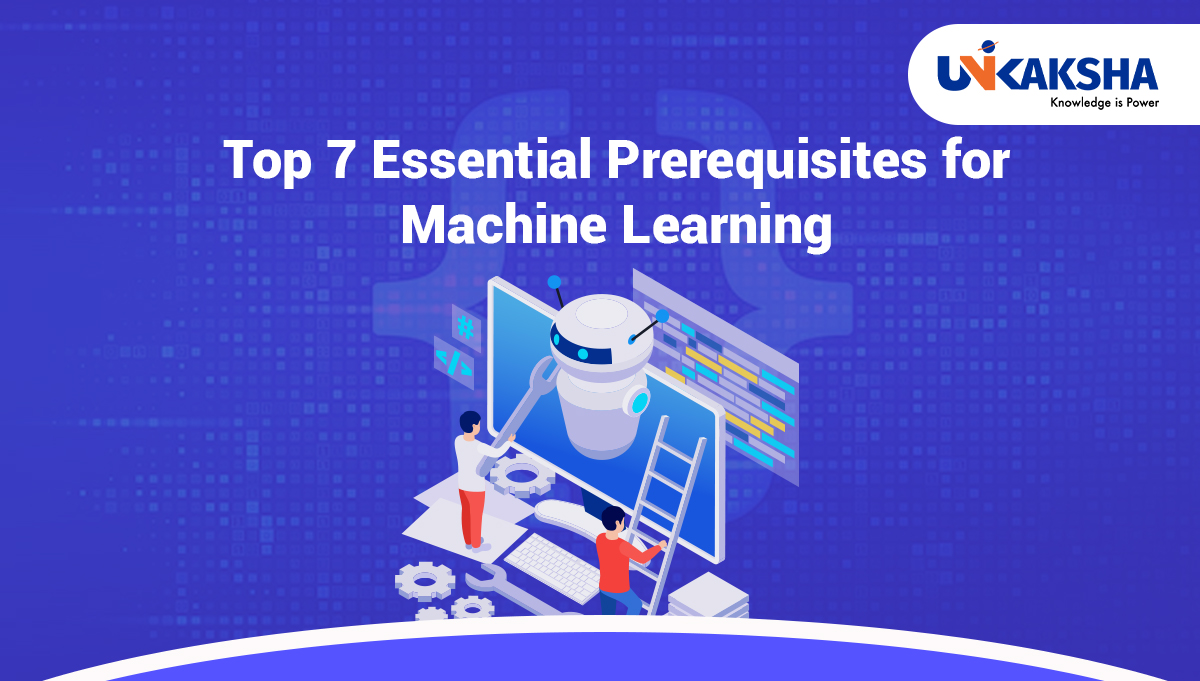Top 7 Essential Prerequisites for Machine Learning


Machine Learning is considered the most significant and in-demand technology of our generation. The scope of Machine Learning is huge, and numerous applications such as image and speech recognition, video surveillance, self-driving cars, virtual assistants, games, chatbots, and Google translation use machine learning in a multitude of ways.
As per a study conducted by Fortune Business Insights in 2020, the expected value of the global machine learning market is expected to be $117.19 billion by 2027 – a whopping 39.2% of Compounded Annual Growth Rate (CAGR).
Machine Learning Market
The Machine Learning market is steadily growing. The deep learning software category is the most distinguished market segment. It is expected to reach around $ 1 billion by the year 2025. It is not only the software category segment that’s expecting unprecedented growth but also the AI-powered assistants and hardware.
The Worldwide AI hardware market revenue is expected to reach $87.68 billion at a CAGR of 37.60% by the year 2026 – Retrieved from NeighborWebSJ. However, we did see a downfall of 12% in AI hardware, especially in the chip business. This impact was due to pandemic COVID-19 and hopefully the market with recover soon – Retrieved from Market Data Forecast in 2020.
Therefore, it is obvious there is now a great demand for professionals adept at working on machine learning projects. So here is a look at some of the essential things for machine learning you need to master when you want to build your career in machine learning.
7 Essential Things for Machine Learning
From email malware and spam filtering to Facebook’s recommendation system, everything is possible due to machine learning. But, before getting into this field and creating the systems to execute special tasks, aspirants are required to inculcate sound knowledge in certain areas.
To get started with machine learning, we have shortlisted essential machine learning prerequisites, these include:
1) Statistics
Statistics mainly involves data collection, analysis, sorting, presentation, and interpretation. Since data is a vital part of any technology these days, it is only natural that people skilled at handling and working with large amounts of data be in huge demand. Without statistics, it won’t be possible for machines to learn and become more intelligent with time.
As a professional working on machine learning projects, you work with two distinct kinds of statistics. These are descriptive statistics and inferential statistics. The task of descriptive statistics is to use numbers to describe a specific type of data set. Descriptive statistics can help to summarize a data set and create meaning out of it. On the other hand, inferential statistics help conclude the samples instead of an entire set of data. As a machine learning professional, you need to gain an in-depth understanding of mean, standard deviation, median, histogram, and outliers.
2) Linear Algebra
Linear algebra is considered imperative to machine learning. However, for many people, the dynamics between machine learning and linear algebra are somewhat vague. This is where abstract concepts like matrix operations and vector spaces come in. Linear algebra often involves working with matrices, vectors, and linear transformations. As a student of machine learning, you should develop the concepts of linear algebra so that you can transform and work on the operations associated with the datasets. Some concepts covered under linear algebra are linear transforms, matrix multiplications, algorithms in code, notations, and tensor and tensor ranks.
3) Probability
The role of probability is to describe the potential chances for some event to take place. The data-driven decisions have their basis on probability. When planning to work on machine learning, some things to learn about probability include concepts like notation, independence, joint and conditional probability distribution, continuous random variables, and the different rules associated with a probability, such as the Bayes theorem, product rule, sum rule or chain rule. While these are just some of the concepts you need to master about probability, there are a lot more probability concepts associated with machine learning.
4) Programming Languages
You need coding knowledge as machine learning algorithms must be written in codes to be effective. You must have proper knowledge of multiple programming languages. Even if you start your career with the mathematical aspects and only have limited knowledge about programming languages, you should try to get acquainted with at least one essential programming language to have a better understanding of machine learning and its internal mechanisms. Some popular programming languages to consider for machine learning are Python, Java, C++, R, and MATLAB.
Many believe machine learning (ML) is identical to artificial intelligence. However, machine learning is but a subset of AI. ML enables the AI to perform tasks faster and more intelligently by providing it with learning capabilities. This makes machine learning the main AI component.
Here is the list of Top 7 Programming Languages for Artificial Intelligence, if you want detailed information about a programming language for Machine Learning, do let us know in the comments section.
5) Calculus
Calculus is an essential tool for building a model for machine learning. It is an integral aspect of numerous Machine Learning algorithms. It means that when you develop your skills with calculus, it strengthens your chances of being successful in a machine learning career. You need to cultivate knowledge about the basic tenets of differentiation and integration, gradient or slope, partial derivatives, and chain rule for training the neural networks.
6) Advanced Signal Processing Techniques
One of the most important things you need to master in association with machine learning is feature extraction. There can be many complications and challenges with this kind of work, and you need to come up with specific types of solutions for each of them. You need to be able to work with Advanced Signal Processing techniques and algorithms like wavelets, curvelets, shearlets, bandlets, and contourlets. Get yourself acquainted with time-frequency analysis to benefit from it while working on your problems. Learn everything about Fourier analysis theorem and convolution.
7) Distributed Computing
When working on machine learning projects, you must cultivate the skills of working with distributed computing techniques as you will need to operate several systems. Machine learning involves working with different types of large data sets, and thus you need to spread the workload over a large base of connected machines. Therefore, you should use tools like Amazon EC2 and Apache Hadoop to help with your project goals as they can make the process simple and cost-effective.
Conclusion:
In this blog post, I covered the top 7 essential prerequisites for machine learning. So basically, it comprises calculus, linear algebra, statistics, probability, programming languages, distributed computing, and advanced signal processing techniques. Do you consider any other prerequisite other than these for learning machine learning? Share your thoughts in the comment section below.
UniKaksha is a digital skill development platform that enables trained tech talent for the jobs of tomorrow, bridging the ever-increasing skill gap in the current workforce. Become an expert Full-Stack Developer in just 90 days with a 100% Placement Assistance TechFit program. Learn in-Demand tech skills with 100+ Courses and Certifications with multilingual support, 24×7 doubt clearing sessions, and regular assessments to track progress. Start your Tech-Career today!
 Related Posts
Related Posts
|
Offerings
|
FutureFirst
|
SmartStart
|
GradEdge
|
SelfMastery
|
|---|---|---|---|---|
|
Doubt clearing session
|
                                          |
                                          |
                                          |
                                          |
|
No of job opportunities
|
15 | 25 | 15 | 3 |
|
Course Access
|
5 Years | Lifetime | Lifetime | 5 Years |
|
Free Library Courses
|
                                          |
                                          |
                                          |
                                          |
|
Job Assurance
|
                                          |
                                          |
                                          |
                                          |
|
Language
|
English/Hindi | 5 Language options | English/Hindi | English/Hindi |
|
Live classes
|
100% | 100% | 100% |                     |
|
Offline
|
                                          |
                                          |
                                          |
                    |
|
Industry Expert Sessions
|
                    |
                                          |
                    |
                    |
|
Internship (IOP)
|
                                          |
Guaranteed | Guaranteed | Based on evaluation |
|
1:1 Mentoring sessions
|
                    |
                                          |
                    |
                    |
|
Customer Support
|
                                          |
                                          |
                                          |
                                          |
|
Dedicated Program Manager
|
                    |
                                          |
                    |
                    |
|
Opt for Placement services
|
Compulsary |                                           |
                                          |
                                          |
|
Career Support
|
1 Year | 18 Months | 1 Year | 3 Months |
|
Regular assessments
|
                                          |
                                          |
                                          |
                                          |
|
Report cards
|
                                          |
                                          |
                                          |
                    |
|
Career Guidance
|
                                          |
                                          |
                                          |
                    |
|
Certificates
|
                                          |
                                          |
                                          |
                    |
|
Scholarship
|
                                          |
Available | Available |                     |
|
Trial Class
|
1 week | 1 week | 1 week |                     |
|
Outside placement
|
Paid | Allowed | Allowed | Allowed |
|
Premium Jobs
|
                    |
                                          |
                    |
                    |